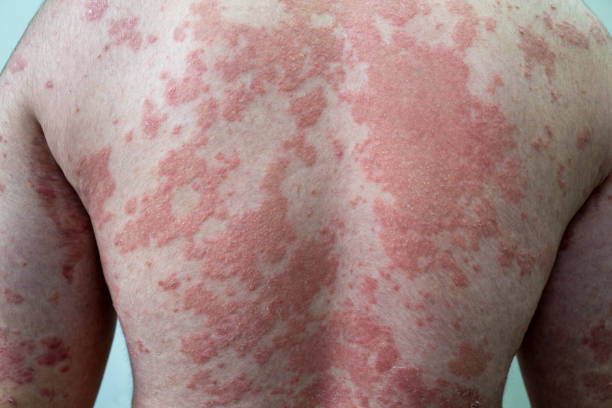Psoriasis is an autoimmune skin disease that causes the skin cells to multiply up to 10 times faster than expected. It is characterised by itching, discomfort, and lumpy or scaly patches on the skin; it can appear anywhere but is commonly found on the knees, trunk, elbows, and scalp.
On darker skins, the patches can be brown, violet, or purple, while on lighter skins, the patches will be red with white scales.
Psoriasis is a long-term disease with no cure that can be passed from person to person, and it sometimes happens with members of the same family.
It is a very painful condition and can make it difficult to sleep and concentrate on anything. In addition, it occurs in cycles; it can last for weeks or months, then stop for a while and return after some time. For people with a genetic predisposition to this disease, things like cuts, infections, burns and certain medications can trigger it and make them develop the condition suddenly.
There are also many types of psoriasis with different signs and symptoms; some of the most common ones include guttate, pustular, inverse, erythrodermic, nail, and plaque psoriasis.
Causes
The specific cause of psoriasis isn’t fully understood, but it is said to be caused by an over-reactive immune system. With this condition, the immune system, which is supposed to destroy harmful invaders such as bacteria on the skin to prevent sickness and infections, begins to attack healthy skin cells by mistake. As a result, the same immune system will create inflammation and swelling, which will be seen as plagues on the skin’s surface.
It usually takes about 30 days for the human body to grow new skin cells and replace old ones, but an overreactive immune system can cause the process to take place in about 3 to 4 days. This can create scales and frequent top skin shedding.
In addition, psoriasis can be genetic; it runs in families and can be passed down to children from their parents.
Symptoms of Psoriasis
Some common symptoms or signs of psoriasis include:
- Skin plagues.
- Dry, cracked skin that may bleed.
- Scalp crust or scales.
- Cyclic rashes.
- Small pits in fingernails and toenails come loose from the nailbed.
- Burning, itching, or soreness.
Treatment
There is no permanent cure for psoriasis, but there are many treatment methods to help manage the condition. Some medications can slow down the growth of new cells, stop itching and dry skin and remove scales from the skin.
Options include creams and ointments, oral or injected medication, and light therapy. The recommended treatment for each patient will depend on the severity, overall health, age, location and size of the rash, and response to some self-care measures.
You may also need to try different medications or a combination of treatments before you find an approach that works. However, even with successful treatment, there is a high chance that the disease will return after a while.



